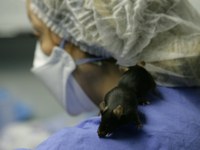Toxicology Study Director

Sarah
Study Director
As a graduate you are totally unaware of all the opportunities and possibilities that are available within the Pharmaceutical Industry. Sarah
So, what do you do?
I am a Study Director of general toxicology studies in rodent and non-rodent pharmaceutical, agrochemical and industrial compounds at a Contract Research organisation (CRO).
I manage all procedures that contribute to a study. I am the single point of study control and have responsibility for the overall conduct of the study and its final report. These reports involve interpretation of clinical data including clinical pathology, clinical signs, electrocardiographs, body weight and organ weight data.
The role involves regular communication with clients and hosting client visits and inspections.
What does your typical day involve?
The main reason I enjoy my job is that it is almost impossible to describe a ‘typical day’. Each day when I arrive at work, however much planning is involved; nothing can ever be predicted. Managing in-life studies often involves urgent questions and immediate decisions. The typical day may involve anything from the initial client communication in regard to designing a study to meet their needs, to the running of the in-life phase of the study to interpreting the data and writing the reports.
Why did you decide on a career in the pharmaceutical industry?
At the beginning of 2004 I was approaching the end of my degree and I was considering the possibilities of further education. Then I saw an advert for a Laboratory Scientist position here. Along with most graduates, finding your first job is the hardest step. As a graduate you are totally unaware of all the opportunities and possibilities that are available within the Pharmaceutical Industry. So when I was offered the position, I jumped at the chance!
How has your career developed since you entered the industry?
I entered the industry as a graduate in June 2004. I began my career as a Laboratory Scientist in the Clinical Special Projects Group within the Histology Department. The work ranged from stand alone histology projects through to complex multi-site clinical trials. The range of activities included immunohistochemical staining procedures, empirical staining techniques, tissue micro array, cryo sectioning and general histology procedures such as sample cut up, tissue processing, paraffin wax embedding, paraffin wax sectioning procedures and staining. Then in September 2005, I became a trainee Toxicology Study Director.
What qualifications and experience did you have when you entered the industry?
I have a BSc (Hons) Anatomical Sciences from the University of Leeds
Do you think additional qualifications or experience would be an advantage for someone entering the industry now? What might be valuable?
Since becoming a Study Director I have researched various courses that I thought would be advantageous, primarily a MSc. However, from discussions with my managers I was advised that the experience that I will gain ‘on-the-job’ will far outweigh any further qualifications. In hindsight, I am very grateful for their advice as the first year as a Study Director has been challenging and a steep learning curve!
I have been interested in immunology since my first role within the company in the Clinical Special Projects Group. I am currently attending various Immunology courses and conferences as I am trying to enhance my knowledge in this area and validate methods to enhance the services that we can provide to our clients.
Do you work mostly on your own or as part of team?
As a Study Director I am the single point of study control, so the majority of the work is conducted on my own. However, various teams work on each aspect study, so there is also a great deal.
What is it like socially where you work?
Excellent! I work for a large company, which can often appear daunting at first, but there are many opportunities to socialise. There is a good social group within my department and there is also a company sports and social club that arrange larger events from bowling to paintballing.
What are you most proud of in your career?
I am proud of the progress I have made in the last three years and the knowledge and experience I have gained.
What possibilities are there for your career in the future?
I hope to develop my career as a Study Director in Toxicology and also develop my expertise in Immunology.
What do you think are the most important skills for someone in your role to have?
Communication, time management, multi-tasking and stress management!!
What one piece of advice would you give to someone seeking a career in the pharmaceutical industry?
At first you will feel out of your depth but stick at it and learn from those more experienced around you!
Last modified: 30 April 2024
Last reviewed: 30 April 2024